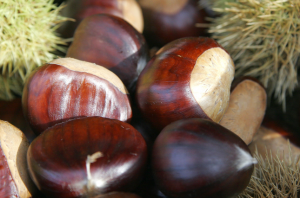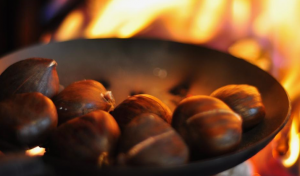It happens every year, November rolls around and we immediately get bombarded with the Christmas season. For some, the lights, decorations and extended store hours marks the beginning of their happiest time of the year, while for others it can be found as dreaded and/ or annoying. Why am I talking about Christmas in an article about how chestnuts should become a part of your regular diet? Because for many -due in large part to the infamous ‘The Christmas Song’ -chestnuts and Christmas go hand in hand.
“Chestnuts roasting on an open fire…” – The Christmas Song, Originally Recorded By Nat King Cole
Whether or not this common correlation applies in your life, here is why chestnuts should get some serious consideration to become a part of your diet all year round:
GREAT SOURCE OF DIETARY FIBRE
At 8.1 grams per 100 gram serving chestnuts are an excellent source of healthy dietary fiber. Insoluble dietary fiber helps to prevent constipation and reduces the risk of other intestinal deficiencies by creating bulk within your stool -which urges the body to pass it quicker. Most nuts are a great source of insoluble dietary fiber and chestnuts are no exception to that. Chestnuts however outperform many of their fellow nuts in fiber content per 100 grams, including walnuts, pecans and pistachios -making them an optimal choice.
SURPRISING SOURCE OF VITAMIN C
When we think of sources of Vitamin C traditionally many of us have citrus fruits such as orange and grapefruit as well as certain vegetables such as brussels sprouts come to mind, however chestnuts are also a powerful source of the vitamin used to prevent and fight disease. Chestnuts offer approximately 43 mg of vitamin C per 100 grams, a pretty respectable figure given that a medium size orange is packed with a comparable 70 mg.
PACKED WITH MINERALS
Chestnuts also happen to be packed with a number of minerals, including but not limited to: calcium, potassium, iron, manganese, phosphorus and zinc. Many of these minerals, such as iron, are best absorbed by a body that has sufficient Vitamin C levels making chestnuts in many ways self-sufficient since they manage to provide both.
GLUTEN FREE
With gluten free choices becoming both more apparent and necessary in the world today, chestnuts serve as a great option to add that nutty flavor to a gluten free dish without needing to strip away that classification. Other gluten free nuts include almonds and hazelnuts.
BLEND OF B VITAMINS
Chestnuts also serve as a great source of several of the b-complex vitamins including B6, folate, thiamine and riboflavin. A simple 3-ounce serving of chestnuts stands to provide 21% of the recommended daily value of B6, a vitamin traditionally received through bran, raw garlic, and particular dried herbs.
Whether chestnuts are made available to you throughout the holiday season or not, be sure to give them some serious consideration the next time you are at the supermarket. Personally I have found them for sale in both the bulk item section (raw) and also de-shelled and packaged in the snack isle -with particular brands carrying an organic option.
SOURCES
Nutrition & You – http://www.nutrition-and-you.com/chestnuts.html
Livestrong – http://www.livestrong.com/article/470050-what-are-the-health-benefits-of-eating-chestnuts/
The Daily Green – http://www.thedailygreen.com/healthy-eating/eat-safe/top-sources-vitamin-C-44102808#slide-1
Health-alicious-ness – http://www.healthaliciousness.com/articles/foods-high-in-vitamin-B6.php
Carols – http://www.carols.org.uk/the_christmas_song_chestnuts_roasting.htm

